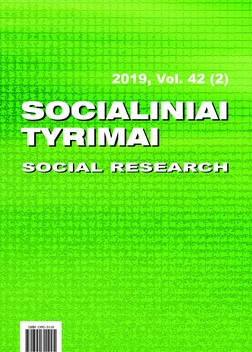Pajamų nelygybės kitimą lemiančių veiksnių poveikio empirinių tyrimų analizė
Analysis of Empirical Research on the Factors Influencing the Change of Income Inequality
Author(s): Laura Diliuvienė, Zita TamašauskienėSubject(s): Labor relations, Welfare systems, EU-Approach / EU-Accession / EU-Development, Financial Markets, Human Resources in Economy, Globalization, Socio-Economic Research
Published by: Vilniaus Universiteto Leidykla
Keywords: income inequality; globalization; technological change; financialization; labour market institutions; welfare state;
Summary/Abstract: Until the last major recession, there was an approach in macroeconomics that income distribution was not significant for macroeconomic processes. However, the recent major recession has prompted policymakers and economists to take into account the phenomenon of income inequality, its economic and social causes and consequences related to poverty, social inclusion, social trust, support of democratic institutions, economic growth, financial and other issues. In recent years, income inequality has been rising in many countries, and the International Monetary Fund, the OECD and other organizations underline the importance of addressing this problem. It is important to choose the right measures to make the right decisions in order to address the issues of growing income inequality. Their choice is influenced by the identification of factors influencing the change of income inequality and the impact assessment. The scale and change of income inequality can be influenced by the factors related to the market economy (globalization, technological progress) and the institutional factors (setting the rules of the game on the market, creating a certain environment). According to the factors analysed in the research, three groups of authors can be distinguished. Some authors (Asteriou, Dimelis, Moudatsou, 2014, Cabral, García-Díaz, Mollick, 2016, Lim, McNelis, 2016, Sheng, 2015, Haan, Sturm, 2017, Wade, 2004, Alvarez, 2015, Elmawazini, Sharif, Manga, Drucker, 2013, Jaumotte, Lall, Papageorgiou, 2013, Çelik, Basdas, 2010, Hermes, 2014, Richmond, Triplett, 2017, Franco, Gerussi, 2013, Stockhammer, Guschanski, Köhler, 2016, Soons, 2016, Jaumotte, Lall, Papageorgiou, 2008) investigate and assess the impact of market factors (globalization, financialization, technological progress) on income inequality, while other authors or the group of authors (IMF, 2014, Arestis, Gonzalez-Martinez, 2016, Checchi, Josifidis, Supic, Beker Pucar, 2017, Feld, Schnellenbach, 2014, Obadić, Šimurina, Sonora, 2014, Calderón, Chong, 2009, Checchi, García-Peñalosa, 2008, Saez, 2017, Jaumotte, Buitron, 2015, Bastagli, Coady, Gupta, 2012, Kenworthy, Pontusson, 2005) distinguish the impact of institutional factors (labour market institutions, welfare state) on income inequality. According to J. E. Stiglitz (2016), the market does not operate in a vacuum – it operates within an institutional setting. Therefore, the third group of authors can be identified that assess the impact of both market and institutional factors on inequality (Stiglitz, 2016, Atkinson, 2003, Josifidis, Supic, 2017, Josifidis, Mitrović, Supić, Glavaški, 2016, Huber, Stephens, 2014, Darcillon, 2015, Lin, Fu, 2016, Ghossoub, Reed, 2017, Kristal, Cohen, 2017, Alderson, Nielsen, 2002, Kus, 2012, Tridico, 2015, Dabla-Norris, Kochhar, Ricka, Suphaphiphat, Tsounta, 2015, Jain-Chandra, Kinda, Kochhar, Piao, Schauer, 2016). The results of empirical studies assessing the impact of different factors on income inequality are contradictory. There is a disagreement on the distinction between different factors influencing the change of inequality as well as the direction and strength of their impact. Therefore, it is relevant to determine what factors determine income inequality and what is their impact on income inequality.
Journal: Socialiniai tyrimai
- Issue Year: 42/2019
- Issue No: 2
- Page Range: 74-84
- Page Count: 11
- Language: Lithuanian

